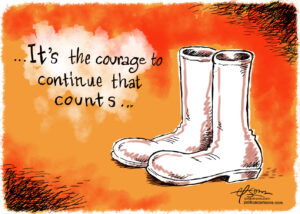Florida Suspect Legally Bought Guns Despite Mental Illness
The suspected killer at a video game tournament had been twice hospitalized in psychiatric facilities, but authorities say he was able to legally purchase the two handguns he carried at the time of the attack.BALTIMORE—Even though the suspect in a shooting at a Florida video game tournament had been hospitalized for mental illness, authorities say he was able to legally purchase the two handguns he was carrying at the time of the attack.
David Katz had a 9mm handgun and .45-caliber handgun when he opened fire Sunday at a gaming bar inside a collection of restaurants and shops in Jacksonville. He killed two people and wounded 10 others before fatally shooting himself during the “Madden NFL 19” tournament.
Divorce filings in Maryland from Katz’s parents say he was twice hospitalized as an adolescent in psychiatric facilities and was prescribed antipsychotic and antidepressant medications.
When buying the weapons, the 24-year-old Baltimore man would have been required by federal law to disclose whether he was ever involuntarily committed to a mental institution.
In addition, in Maryland, where Katz purchased the weapons, state police require gun buyers’ consent for a state health agency to disclose whether they suffer from a mental disorder, have a history of violent behavior or have been confined for more than 30 consecutive days to a mental health facility.
The divorce filings do not clearly indicate whether Katz was hospitalized voluntarily or involuntarily, and the two hospitalizations described in the documents were both shorter than 30 days. In addition, Katz’s hospitalizations may have occurred before the Maryland Legislature revamped the state’s firearms laws following the 2007 mass shooting at Virginia Tech.
“It appears that these disqualifications did not apply to David Katz,” said Daniel Webster, director of the Johns Hopkins Center for Gun Policy and Research.
There is no federal requirement for psychiatric hospitals or courts to report involuntary commitments to the FBI for inclusion in the database used for gun-purchase background checks.
The divorce records show Katz’s parents disagreed on how to care for their troubled son, with his father claiming his estranged wife was exaggerating symptoms of mental illness as part of their long and bitter custody battle. The couple divorced in 2007.
Jacksonville Sheriff Mike Williams has declined to comment on the gunman’s motive.
The suspect’s father, Richard Katz of Baltimore, and his mother, Elizabeth Katz of Columbia, Maryland, did not respond to phone messages Sunday or Monday. Efforts by The Associated Press to reach them at their homes were also unsuccessful.
The Howard County, Maryland, divorce filings say David Katz played video games obsessively as a young adolescent, often refusing to go to school or bathe. Elizabeth Katz, a toxicologist at the Department of Agriculture, said she confiscated some of her son’s gaming equipment after finding him playing in the wee hours.
“His hair would very often go unwashed for days. When I took his gaming equipment controllers away so he couldn’t play at 3 or 4 in the morning, I’d get up and find that he was just walking around the house in circles,” the mother said, according to a transcript in the court files.
At one point, she put his gaming controllers in her bedroom behind a locked door and he punched a hole in the door, she said.
Elizabeth Katz said her youngest son had increasing difficulty concentrating following his parents’ split. A judge awarded custody of the boy to his mother, with visitation rights to the father.
At times David “curled up into a ball,” refused to attend school and sobbed, she said. She asserted that her ex-husband instructed David not to take Risperidal — an anti-psychotic medication prescribed to him. The father claimed in court filings that David was not “diagnosed as psychotic.”
He missed large stretches of school while under his mother’s supervision. He was admitted to the nearby Sheppard Pratt mental health system for about 12 days in late 2007. Court documents say a psychiatrist at that time administered antidepressants. He later spent about 13 days at Potomac Ridge, a mental health services facility in Rockville.
Richard Katz, a NASA engineer, said his ex-wife had “an obsession with using mental health professionals and in particular psychiatric drugs to perform the work that parents should naturally do.” He said she routinely gave false information to mental health care providers. He described one incident in which his son was handcuffed by police after locking himself in his mother’s car in an attempt to avoid going to a mental health appointment with her.
In a 2010 letter, David Katz wrote a letter to a magistrate judge saying he wanted to live with his father and describing his mother as “pretty crazy.” He said she called the police to the family’s home about 20 times and “gets drunk.” He blamed her for his poor grades.
Despite the problems, Katz graduated from Hammond High School in Columbia in 2011. He went on to attend the University of Maryland, though he did not earn a degree.
Katz used the gamer tags “Bread” or “Sliced Bread” when competing. The game’s maker, EA Sports, lists a David Katz as a 2017 championship winner.
On the Madden competition circuit, Katz was known to barely speak to fellow gamers and sometimes exhibited an erratic playing style, according to other competitors.
“We’ve always known he was a little off and stuff just because he wasn’t social at all,” Shay Kivlen, 21, of Seattle, said Monday in an interview.
___
Biesecker reported from Washington. Associated Press writer Russ Bynum in Jacksonville, Florida, contributed to this report.
Your support matters…Independent journalism is under threat and overshadowed by heavily funded mainstream media.
You can help level the playing field. Become a member.
Your tax-deductible contribution keeps us digging beneath the headlines to give you thought-provoking, investigative reporting and analysis that unearths what's really happening- without compromise.
Give today to support our courageous, independent journalists.






You need to be a supporter to comment.
There are currently no responses to this article.
Be the first to respond.